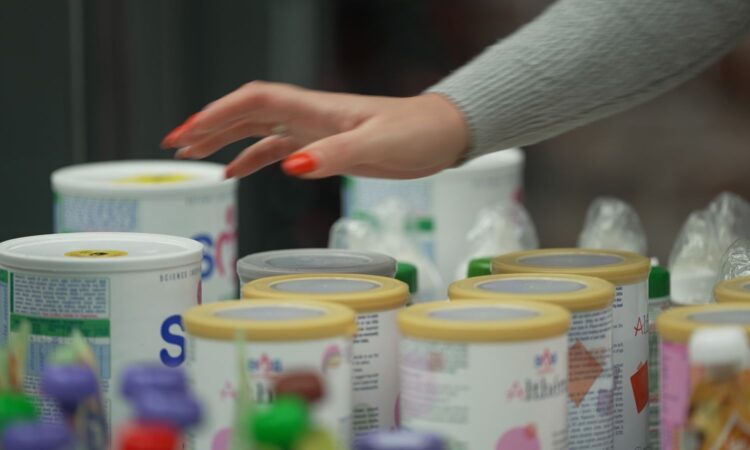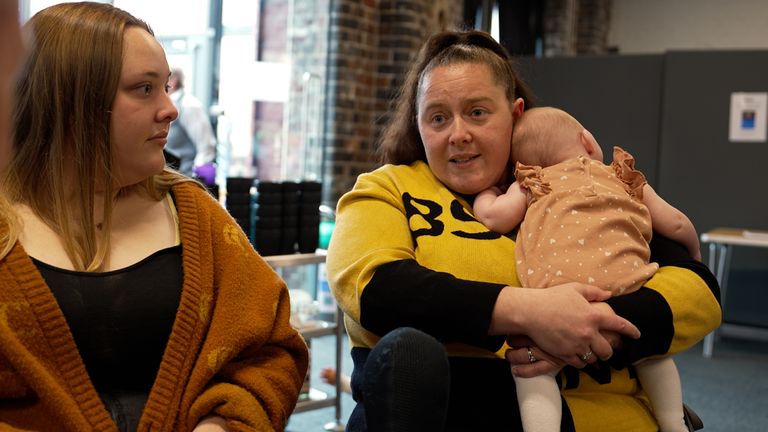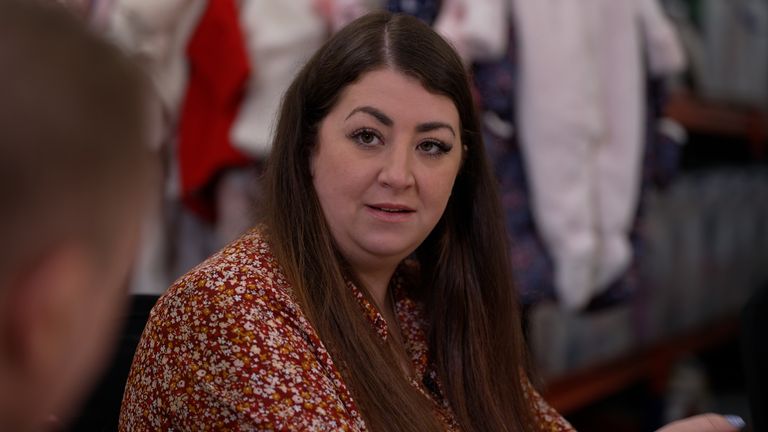
Formula milk is now regularly being rationed by baby banks as they try to cope with a surge in the numbers of families struggling to afford to feed their babies.
In May, Sky News revealed the desperate measures parents are taking to feed their babies due to the rising costs of formula milk in the shops.
We learnt that families are resorting to stealing formula, buying it on the black market, foraging on Facebook Marketplace, watering down milk or substituting condensed milk for formula.
The latest on the cost of living crisis
Baby banks across the nation are now reporting increasing and “unsustainable” levels of demand for baby essentials and huge frustration about the lack of government intervention.
High Peak Baby Bank in Derbyshire has to restrict families to three tubs a month.
Sebby’s Corner in Barnet described “heartbreaking” conversations it has to have with families when it can’t help them.
Hartlepool Baby Bank said: “We’ve had to implement restrictions for the first time in our history, to keep up with demand.”
Read more: What will I say to the next family that comes along desperately in need of formula?
Growbaby in Swindon also now rations families to just one tub of formula per family per week.
In Swindon we met 23-year-old Kayla and her daughter Ivy who is four months old.
Kayla hates the fact that her maternity pay from her job, combined with her partner’s wages, still doesn’t enable them to afford all the essentials for their baby.
Read more:
What can you do if you’re struggling to buy baby formula?
Soaring cost of baby formula leading to unsafe feeding practices
‘It is literally a milk crisis’
Data from First Steps Nutrition shows average prices have risen 24% over the past two years.
“It is literally a milk crisis,” Kayla said.
“It makes me feel so angry and irritated that parents are forced to feel ashamed that they can’t afford milk for their babies.
“The government are not listening.”
A plea for government help
Her sister Jade pleaded with the government to step in: “Please help, help those mums, help those dads. Don’t ask questions, just do.
“Don’t sit there and judge and look and ponder just do it. It’s as simple as that.”
Earlier this week Sky News was invited into one of the first meetings of the Baby Bank Alliance – a movement that hopes to unite 300 baby banks and push for meaningful change for families.
“There is vast need in the UK but it is always under the radar,” organiser Hannah Pentith told Sky News.
“There are very basic policy issues that would really change the outcomes for families.”
The Love, Amelia baby bank in Sunderland, which hosted the Baby Bank Alliance meeting, now regularly sees social workers, health visitors and midwives in need of help to meet the cost of the essentials for their own babies.
‘This shouldn’t be happening
Chief executive Steph Capewell told Sky News: “It wasn’t long ago we were all clapping for them on the doorstep and then they are coming to a food bank and a baby bank for their own families.
“This shouldn’t be happening.”
She is hopeful that by forming a new alliance they can more effectively make the case for change.
She added: “One of the things I am hoping to get from this is taking it further to policymakers and decision makers because when the prevention happens you see the change in the community as to the response that’s needed.”
Click to subscribe to the Sky News Daily wherever you get your podcasts
High price of baby formula under investigation
The root cause of the problems families face is the high price of baby formula in the shops, which is currently under investigation by the Competition and Markets Authority.
In Scotland, work is ongoing to find “cash first” solutions for families in extreme hardship, but in the rest of the UK there is little change.
The Westminster government has been contacted for comment but has not responded.
It previously told Sky News: “We recognise the impact rising prices are having on families which is why we are providing significant support worth on average £3,300 per household, including holding down energy bills, uplifting benefits and delivering direct cash payments.”









